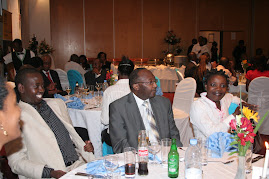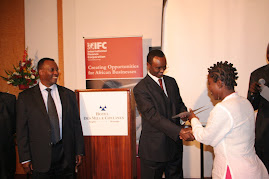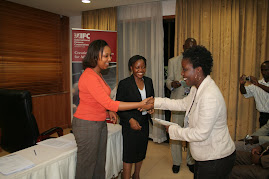dimanche 25 octobre 2009
Service gap between Kigali and upcountry
Monday, 26th October 2009
CUSTOMER CARE: Service gap between Kigali and upcountry
By Sandra idossou
I’m this morning a happy person as I sit to enjoy my white chocolate mocha with two delicious cookies at the Bourbon Coffee Shop in Kigali. I think I have never felt so good in this coffee shop ever since I came to Rwanda.
I was greeted by a smiling Abdi who said “it’s a pleasure to see you again Sandra”. Wow, I felt like on another planet.
His friendliness and his enthusiasm were simply contagious. My white chocolate mocha was served by Claire within just 10 minutes and this with yet another big smile.
As I kept on appreciating the joy of being served so well in Kigali, I couldn’t understand why there was such a huge difference in service delivery outside Kigali.
I was in Gitarama yesterday, just 45 minutes drive from Kigali and was quite surprised by the miserable service in this hotel called “GM Lando”.
From my other experience in Butare, I really didn’t have any feeling of writing this week about hospitality but believe me dear readers, this new experience just blew me off because I had the impression that good customer care stops here in Kigali.
I was with a group of seven people who had earlier on booked and paid for nine rooms. But when we got there, two people could not get their rooms.
What we received there could not be called service. We waited for more than 2 hours to have a meal they charged Rwf3500.
There was no running water in my bathroom and I had to beg for hot water in a basin from the kitchen.
Breakfast was a rare commodity and to avoid getting a heart attack, I simply ran away from Gitarama with the 8 o’clock bus without having breakfast at this so called hotel. To be frank, this new experience made me feel angry, frustrated, depressed but most especially very skeptical about service providers outside Kigali.
And As I sit here writing this article at the Bourbon Coffee in Kigali, I have the impression to have traveled from another planet just by a 45 minutes drive.
In the bus, I kept on wondering what could be the cause of such a huge difference between service delivery in Kigali and upcountry.
I do not want to generalize this but I think many service providers are just on their own when they are up country?
It seems like they are exempted from all that is happening in Kigali. Is good customer care only for those in Kigali? Is it too much to request for good customer care upcountry?
If service at just 45 minutes drive from Kigali is so poor, you can imagine what it will be in Kamembe or at a place that is 6 hours drive from Kigali.
Someone needs to look through this. There must be a reason. Maybe the national awareness campaign on customer care has not well crossed the borders of Kigali or maybe some business owners upcountry are waiting for the customer care steering committee to come and implement good customer care practices in their businesses.
And this is impossible by the way. Whether in Kigali or upcountry, business owners need to understand that they owe their customers minimum standards of care.
Whether in Kigali or in Butare, if you are a business owner, you need to respect the following basics:
1. Offer adequate training to all your staff
Whether a small or big organization, whether in Kigali or in Gisenyi, you will need to spend time to train your people especially when you recruit them.
Your people should be fully informed about your products and services available. Continuous training will empower your employees and offer them tools and ability to offer quality service as well as to solve problems.
Much as I agree that it costs money to train people, it will cost you more if you decide not to.
2. Make your staff see the benefit of good customer care
It is important you discuss about the benefits of customer care with your staff.
Let them see that they are the first beneficiaries of good customer care. And this benefit has a larger impact on the country as a whole.
By offering your staff incentives, recognition, good salaries, your team members will better understand their role as ambassadors of your company and of Rwanda.
3. Be an example and remain firm
As a business owner, live by what you preach. Be the good example of customer care yourself. Let your staff learn through the way you behave towards customers.
In this hotel in Gitarama, the owner kept on saying “I’m sorry” without really offering any adequate solution.Even if you employ relatives in your business, be firm to all employees when it comes to customer service. Do not accept mediocrity.
Do not think because you are upcountry, you can behave anyhow towards customers.
Customer service is a compulsory element for any business whether in Kigali or upcountry. Even if you are upcountry, you still need to be competitive and this requires that you aim at good customer care.
Remember that a repeat customer is the result of the good relationship you build up through excellent customer service and this no matter where you are.
The author is a customer service consultant working in Rwanda
sandra.idossou@sheiconsulting.com
www.sheiconsulting.com
lundi 19 octobre 2009
Do our Hotels respect Standards of Operation?
Monday, 19th October 2009
CUSTOMER CARE: Do our hotels respect standards of operation?
By Sandra idossou
As a consultant and a trainer on customer service, I often go to places to have a real feeling of services offered to customers. As I’m writing this article now, I’m in room 18 of a hotel in Butare called Ibis.
From the information gathered before coming here, this is the best hotel in town and the most frequent stopover for many tourists.

When I checked into the room, there was no remote control for the television and no telephone directory on the hotel services to even contact the reception.
Just imagine that incase of emergency in this room, there is no way to reach the reception or even call an outside number.

I then went to the reception to report about my missing remote control and a man was sent to check also the 2-channels-television that was not working either.
And guess what? The man simply told me that the television could not be clearer because of the antenna.
He promised to come back with the remote control but I waited the whole evening and he never showed up and the television never worked.
In the bathroom, there is no bathmat but rather an unhygienic wooden block. I know that when you pay $50 a hotel room, you do not expect luxury but a bathmat is the minimum you can ask for to avoid having water everywhere after a shower.

In the restaurant, Grace the waitress was very friendly and professional even though she doesn’t speak fluent English or French. She knew her job and was available. The food was also excellent.
 I could also continue to write about the light by the bedside that is directly fixed in the eyes preventing one from reading in the bed.
I could also continue to write about the light by the bedside that is directly fixed in the eyes preventing one from reading in the bed.

But this 2-days–experience will fit in a book so I decide to check on trip advisor the comments of other guests who have stayed in this hotel.
For your information http://www.tripadvisor.com/ is a free travel guide and research website that hosts reviews from users and other information designed to help customers plan their vacations.
There are over 25 million views and comments on all destinations including Rwanda.
On this hotel called Ibis, I was happy to find some positive comments but wasn’t surprised to read the many negative comments by customers.
Just imagine the impact of these negative comments on Rwanda!!!
And it is for this reason that something urgent needs to be done concerning norms and standards of the numerous hotels opening up in all corners of the country.
A hotel is a public place that should be constructed in respect of norms and standards.
Any establishment whether a hotel or a guest house needs to meet relevant standard requirements such as quality in areas of cleanliness, service delivery, bedrooms linen, furnishings, electrical equipments, health and safety, bathrooms, fire precautions, food safety and hygiene etc..

Much as we are all happy that the country now records 4,225 hotel rooms compared to 3,438 last year, all should not be on the numbers but rather quality as well.

My question here is to know if the owners of these hotels go through any sort of counseling before they put up their hotels. When I read through the international norms of classification of hotels, there are so many hotels here that cannot be rated.
Hospitality just like many other businesses needs professionalism. You just don’t become a hotelier like that. As a hotel owner, you cannot put a niece or a nephew there without offering the basics of training.
When you invest in the “Hard” that is the building and the equipments, you also need to invest in the “Soft” that is the Staff.
As I went for breakfast the following morning at the Ibis hotel, the lady was eating right in front of customers. And when I told her some things were missing on the buffet, she looked at me as if I was disturbing her breakfast. While I was insisting; she told me that after all breakfast is free so if I come and do not find certain items on the buffet, I must as well accept it like that.
Dear readers, I thought I was dreaming. Apparently, this waitress didn’t know that when the rates are inclusive, it doesn’t mean that breakfast is free. I really think hotel owners need to be called upon by authorities. They need to be thought standards of operations. They need to understand that the image of the country relies on a big part on them and their team members.
Hotels are the first service providers that every tourist or investor uses when he/she arrives here. So let’s work urgently on their standards and quality.
Customer care is beyond just the greeting and the friendliness. It is also the respect of standards and the quality of the products we are offering.
The author is a customer service consultant presently working in Rwanda
sandra.idossou@sheiconsulting.comhttp://www.sheiconsulting.com/
dimanche 11 octobre 2009
Our Attitude determine our Altitude
 Monday, 12th October 2009
Monday, 12th October 2009http://www.newtimes.co.rw/index.php?issue=14046&article=2135&week=42
CUSTOMER CARE: Our attitude will determine our altitude
By Sandra idossou
Customer service has been for several months now the main topic of discussion in town and in the media. A lot of effort is being made to improve on service delivery both in the public and private sector here in Rwanda.
Customer care evolves around three main elements that are crucial and often described as the “ABC” of service. They are Attitude, Behavior and Competence.
The Attitudes and Behaviors play such an important role that they often outshine over skills and competence. In a Harvard survey, it has been proven that skills represent only 15 percent on the impact of customer service while Attitudes represent 85 percent.

Our attitudes dictate to our mindset and make us adopt certain behaviors. Our mindset is therefore very important. Johan Wolfgang von Goethe says that “Behavior is a mirror in which every one displays his own image.”
Talking about customer care means improving the way we behave in the society first towards one another then towards the customer. Do we greet one another in town?
Do we show consideration to people around us? Do we value the people we meet? Do we still think that greeting an unknown person for instance is a sign of inferiority? Our answers to the above questions should help us understand the type of mindset and attitudes we show to people in our societies.
What is an attitude by the way? Attitudes are defined as the established ways of responding to people and situations that we have learned, based on the beliefs, values and assumptions we hold. Attitudes also manifested through your behavior.

John C. Maxwell says that “We choose what attitudes we have right now. And it’s a continuing choice.”
We are not born with our attitudes. It is always a choice we make. In front of daily life’s situations, we have the power to react either positively or negatively. It’s simply our personal decision.
An example of the type of attitudes we need to change is what happened to me some time back as I was walking on pavements of Nyarutarama.
I almost received a big spit on my face from this pedestrian. What really shocked me was the reaction of this man. He didn’t feign any sign of apology. He didn’t have any regret of whatsoever. He simply looked at me and continued walking without any word.
This incident made me think about how we deal with one another in our daily lives. There is no way we can achieve good customer care behaviors if we are not able to show courtesy and good manners towards the people we live with.
Customer care should imply that we show each other some consideration, respect, civility, courtesy and care.
Let’s start with this change in our attitudes and this will definitely been seen in our professional lives.

Being courteous to each other is not only respectful to others, but it directly reflects on we are as a people. How can we talk about customer care when we cannot say a simple phrase like “I’m sorry”? Saying “Sorry” is not a sign of inferiority but rather a sign of greatness.
In our daily lives, for instance, let’s be courteous and greet people we meet whether they are our friends or not. A “hello”, “thank You” and “goodbye” should be part of our daily vocabularies.
Another thought that came into my mind after the behavior of this man who almost spit on me; was that maybe he didn’t know he had done something wrong.
That’s why a lot of efforts need to be done at local levels. I know many people do not have access to The New Times to read some of the articles on Customer Care or simply just be part of the national awareness campaign on Customer Care being implemented by the Rwanda Development Board.

But the challenge for this country is that every person should be part of what is happening towards the improvement of service delivery.
It is for this reason that I’ll respectfully call upon local authorities to sensitize people at local levels. During the Umuganda for instance, discussions should be on attitudes that promote good customer care in our societies.
As says William Glasser, “If you want to change attitudes, start with a change in behavior. Gradually, the old, fearful person will fade away.”
Let’s all start today to adopt positive attitudes for a quick behavioral change in our societies for the benefit of all of us here.
Remember “Your attitude, not your aptitude, will determine your altitude.” says Zig Ziglar.
The author is a customer service consultant working in Rwanda.
sandra.idossou@sheiconsulting.com
dimanche 4 octobre 2009
Let's become the Police of Service Providers
 http://newtimes.co.rw/index.php?issue=14039&article=2115&week=41
http://newtimes.co.rw/index.php?issue=14039&article=2115&week=41 Upon informing the public through the newspaper; we later on heard that after investigating this story, the management of the hotel took a very serious sanction against the staff involved.
My first reaction after reading this story was to appreciate this customer for publicly reporting this incident. There are so many things happening in service providing companies that are not known to the managers and owners.
By reporting poor customer service experiences, we are all taking responsibility in the national awareness campaign against poor service delivery.
I often think that as customers, we sometimes underestimate our role. We often sit down and suffer without complaining.

We accept mediocrity and even buy them as we continue to patronize these same poor service providers. Some of us even behave as beggars.
Today, many consumers do not know this quotation by Sam Walton that says that: “There is only one boss. The customer. And he can fire everybody in the company from the chairman on down, simply by spending his money somewhere else.”
As consumers, we need to know that we are important and should be treated as such. If we do not receive the good services we deserve and have paid for, we need to do something.
Thank God, we have choices nowadays on many products and services in town. We can either stop going to this service provider or complain to the business owner.
Keeping quiet and murmuring will unfortunately not solve poor service delivery in our societies.
In today’s economy, if we do not start complaining, nothing will change and service providers will keep on offering us what they want.

When we complain, it is not because we just want to disturb or criticize. It’s really because we have the business owner at heart. We want them to improve on the services so that we can continue patronizing their businesses. Since the country has embarked on this campaign against poor service; many things are being done.
Many companies for the first time; have offered basic trainings on Customer Care. Some other people have had discussions with their team members on how best they can improve on their service.
But this campaign needs the involvement and of all of us; meaning the Customer, the Staff and the Managers.
We can recognize in the story above that if the customer had not taken time to write about this negative experience, the managers will not have been aware of some of the bad behaviors of the staff.
Managers are not always there 24h a day and even when they are there, they do not see exactly what we see as customers. It is for this reason that they need us to become their “eyes” or even the “police” of their services.

Becoming the “police of service providers” means taking time to write a letter to the manager, making suggestions, commenting on what they provide. In brief, being part and parcel of the service delivery.
Recently in South Africa, there was a hotline number that was given to the public to report the poor services they receive and within one hour after the launch, there were more than 7000 calls.
A friend told me that such a hotline already exists in Rwanda, but I do not know how effective it is. I checked on the website of the Rwanda Utilities Regulatory Agency (RURA) whose mission is to regulate certain public utilities such as the telecommunications and electricity and I was amazed to see that apparently consumers can lodge complaints on certain service providers.
This is such a good idea that needs to be known to the general public.
I want to conclude here by suggesting that we all come together to create a forum whereby we will start writing to appreciate not only the good service providers but also to complain against those who are not following the trend of good customer care.

Let’s all get the habit of giving the names or those who offer both good and poor services.
Let our service people know that we are taking charge now and will be watching out. Let them know that we have become the “police” of their services.
If you want to be part of this movement, join us by sending your feedback and comments on the services you receive. We are privileged to have The New Times publishing our letters.
This will definitely emulate others and improve on the image of service in this country for the benefit of all of us.
The writer is a customer service consultant working in Rwanda





























